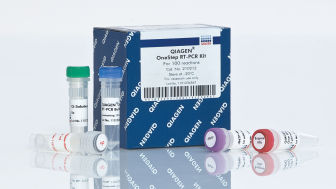
Products

QIAGEN OneStep RT-PCR Kit (100)
Cat. No. / ID: 210212

QIAGEN OneStep RT-PCR Kit (1000)
Cat. No. / ID: 210215

QIAGEN OneStep RT-PCR Kit (25)
Cat. No. / ID: 210210
Features
- Fast and easy one-tube setup
- Efficient one-step RT-PCR of any RNA template without optimization
- Unique enzyme mix for high specificity and sensitivity
- Balanced mixture of enzymes with optimized reverse-transcription buffer
Product Details
Performance
See figures
Principle
The QIAGEN OneStep RT-PCR Kit is designed for easy and sensitive one-step RT-PCR using any RNA template.
The QIAGEN OneStep RT-PCR Enzyme Mix contains a specially formulated enzyme blend for both reverse transcription and PCR. The unique combination of Omniscript and Sensiscript Reverse Transcriptases, with their high affinity for RNA templates, ensures highly efficient and sensitive transcription of RNA amounts from as little as 1 pg up to 2 µg. After reverse transcription, reactions are heated to 95°C for 15 minutes to activate HotStarTaq DNA Polymerase and simultaneously inactivate the reverse transcriptases. This hot-start step eliminates nonspecific amplification products such as primer dimers and reduces background smear, ensuring highly sensitive and reproducible RT-PCR (see figures " Highly specific RT-PCR using low amounts of template" and " Efficient detection of viral RNA").
Wide range of annealing temperatures
The optimal primer annealing temperature is dependent on the base composition (i.e., the proportion of A, T, G, and C nucleotides), primer concentration, and ionic reaction environment. QIAGEN PCR Buffers contain both K+ and NH4+ and deliver high yields of specific PCR product over a wide range of annealing temperatures (see figure " Increased specific primer annealing"). This specificity is achieved by destabilizing non-specifically bound primers, providing a more robust reaction environment and eliminating the need for tedious annealing temperature optimization. In contrast, the range of optimal PCR annealing temperatures is smaller and less predictable using a PCR or one-step RT-PCR buffer that only contains K+, as illustrated in figure " Influence of annealing temperature on specificity".
QIAGEN OneStep RT-PCR Buffer has been specially developed to allow both efficient reverse transcription and PCR amplification. The buffer contains novel additives that prevent inhibition of PCR amplification by reverse transcriptases, a problem often encountered in one-step RT-PCR. The buffer ensures specific primer annealing over a wide range of temperatures and Mg2+ concentrations; providing robust and highly efficient RT-PCR from any RNA template. The QIAGEN OneStep RT-PCR Kit includes Q-Solution, an innovative additive that modifies the melting behavior of nucleic acids. Q-Solution facilitates reverse transcription and amplification of templates with a high GC content or a high degree of secondary structure (see figure " RT-PCR of GC-rich template"). Using Q-Solution simplifies optimization of RT-PCR for difficult templates. The QIAGEN OneStep RT-PCR Kit includes everything required for faster and easier RT-PCR for even the most sensitive applications (see table).
| QIAGEN OneStep RT-PCR Kit contents | Features |
|---|---|
| HotStarTaq DNA Polymerase | Highly specific products |
| Sensiscript and Omniscript Reverse Transcriptases | Wide range of RNA amounts (1 pg – 2 µg) High sensitivity |
| OneStep RT-PCR Buffer | Minimal optimization needed No inhibition of PCR by reverse transcriptases Inhibition of RNases |
| Q-Solution | Facilitates amplification of GC-rich templates |
See figures
Procedure
The QIAGEN OneStep RT-PCR Kit allows fast and easy RT-PCR setup. Whatever the application — virus detection, molecular diagnostics research, or gene expression analysis — just mix all components together in one tube and start the thermal-cycler program (see flowchart " OneStep RT-PCR procedure"). The reaction mixture contains all of the reagents required for both reverse transcription and PCR; nothing needs to be added once the reaction has been started (see table).
See figures
Applications
The QIAGEN OneStep RT-PCR Kit is suitable for RT-PCR applications such as:
- Virus detection
- Single-cell RT-PCR
- Gene-expression analysis
Supporting data and figures
OneStep RT-PCR procedure.
The QIAGEN OneStep RT-PCR Kit allows fast and easy RT-PCR setup. Whatever the application — virus detection, molecular diagnostics research, or gene expression analysis— just mix all components together in one tube and start the thermal-cycler program. The reaction mixture contains all of the reagents required for both reverse transcription and PCR; nothing needs to be added once the reaction has been started.

Specifications
| Features | Specifications |
|---|---|
| Applications | Gene-expression analysis, virus detection |
| Mastermix | No |
| Enzyme activity | Reverse transcription, 5' -> 3' exonuclease activity |
| Reaction type | One-step RT-PCR |
| Real-time or endpoint | Endpoint |
| Sample/target type | RNA template |
| Single or multiplex | Single |
| With/without hotstart | With hotstart |






